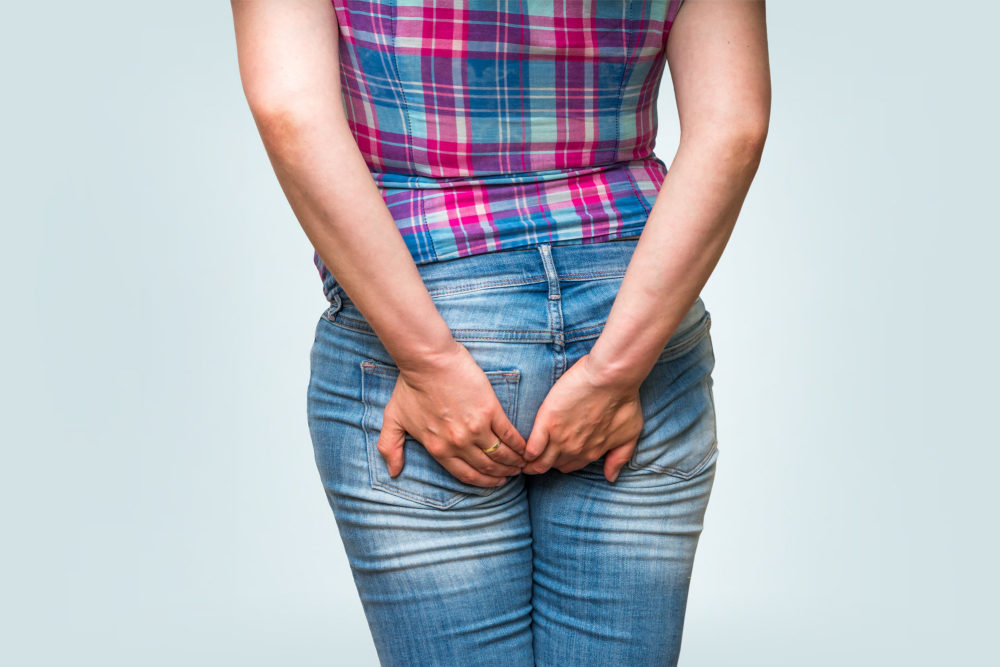
This article discusses what you should do when you accidentally eat gluten despite following a strict gluten-free diet due to celiac disease or gluten intolerance. I’ll also share home remedies that may help you recover quickly after gluten exposure. This post contains affiliate links and is not a substitute for medical advice or care. Please read my disclaimers.
The thing I fear most happened to me: I ate a piece of gluten.
My friend thought she bought gluten-free cookies from Trader Joe’s, but she was confused by the packaging and instead served me regular cookies made with wheat flour!
I only ate a small bite of the cookie before we realized the mistake. And my friend was extremely apologetic. I tried to minimize the situation by telling her it was okay, but all the while, I was secretly panicking.
Would I get sick? Would I have diarrhea and bloating for days? Would my geographic tongue flare up? Would I get annoying acne?
I didn’t know what to expect because it’s always hard to pinpoint exactly how I would react to gluten exposure.
In the past, whenever I felt sick after eating, I’d blame gluten. But the truth is, I had never knowingly eaten gluten. I only suspected I had.
But in this case, I knew with absolute certainty that I had eaten a piece of gluten. I was terrified.
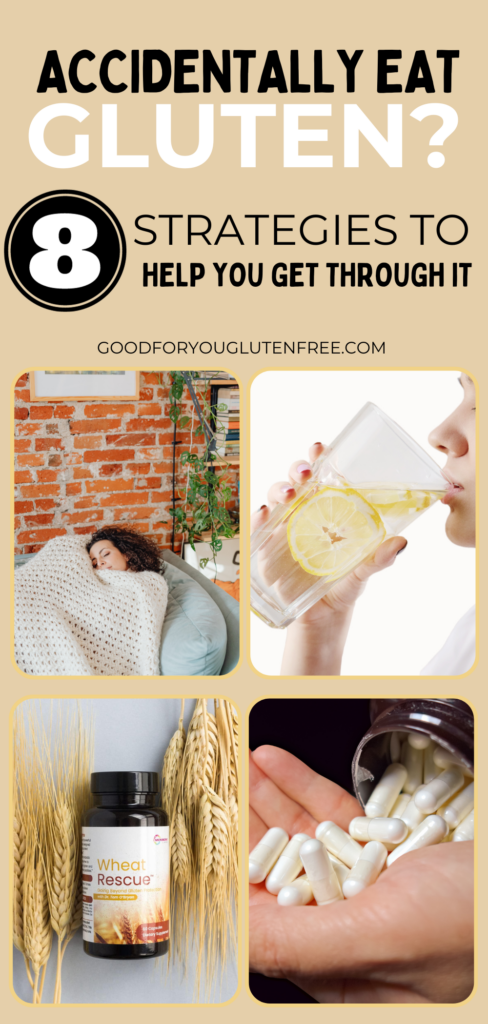
What Happened After I Ate Gluten
Surprisingly, I didn’t get sick or bloated after eating the gluten cookie. I was fine.
How could this be? I ate gluten! I should be sick as a dog, spending hours on the toilet, right?
While I got off lucky in this situation, most of the time, I’m not so fortunate.
Most people who accidentally eat gluten, a sticky protein found in wheat, rye, barley, and sometimes oats, feel sick. They may race to the bathroom to violently purge the ill-gotten protein.
Despite your or my best efforts, gluten happens.
When I suspect I’ve been accidentally glutened, it takes about 60-90 minutes for me to bloat up like a balloon. I become incredibly gassy. Eventually, I’ll race for the bathroom to purge the offending protein.
Others might experience headaches, skin breakouts (acne, rashes), fatigue, or a combination of these devastating symptoms.
And sometimes, we have no symptoms at all, leaving us scratching our heads, wondering why gluten sometimes creates chaos in our bodies and sometimes doesn’t.
The reaction varies from person to person and likely depends on how much gluten someone accidentally ate. Read more about this topic in my article, What Happens If You Eat Gluten With Celiac Disease?
I feel better once I purge gluten from my system and take time for self-care.
However, how “easily” you process gluten depends on the strength of your digestive system and how much gluten you have consumed.
The good news is that if you’ve been on the gluten-free diet for a while, your body has had time to heal, and your intestinal lining is likely stronger and more resilient than it was when you first started a gluten-free diet.
What Do You Do When You Accidentally Eat Gluten?
Gluten happens; when it does, you might wonder what you should do.
I asked my gluten-free Facebook community to share their best tips for handling accidental gluten exposure and what they do to feel better after inadvertently eating gluten.
I’ve captured what they told me below, along with some personal anecdotes and other research.
It’s important never to consume gluten when on a gluten-free diet, regardless if you have celiac disease or gluten intolerance.
Continuously cheating on your gluten-free diet will harm your body, but one exposure to gluten probably won’t, especially if you’ve put in the hard work to heal your body and gut.
The remedies detailed below are for one-time accidental gluten exposure only and should not be used as an excuse to eat gluten nor as a remedy for careless eating.
Also, implement these strategies as soon as you realize you’ve been glutened – don’t delay! The more quickly you get in front of it, the faster you will likely recover.
Remedy #1: Hydrate Like Crazy
Drink a lot of water after an accidental glutening to flush your digestive system and help eliminate whatever you ate or drank more quickly.
I recommend adding a squeeze of lemon to your water, too. Lemon is alkalizing, helping you more quickly restore your body’s natural pH balance.

Another herb to consider adding to water is ginger. Ginger has natural anti-inflammatory properties known to aid in digestion.
Warm tea with lemon and ginger may help to settle your stomach and calm the inflammatory fire inside you.
Drinking plenty of water is also essential if you experience diarrhea after consuming gluten. Water will replenish the lost liquid and ensure you don’t become dehydrated.
You can also drink unsweetened coconut water as a natural remedy to replenish lost electrolytes.
Coconut water contains sodium, potassium, calcium, magnesium, and phosphorus. It’s a better alternative to electrolyte drinks like Gatorade, which is loaded with sugar and artificial dyes.
Remedy #2: Consider Digestive Enzymes
Your body already produces a plethora of digestive enzymes naturally. These enzymes help break down and improve the absorption of food.
Today, you can purchase gluten digestive enzyme supplements to inflate the number of digestive enzymes in your body and aid in the breakdown of food. This can be particularly helpful in people with digestive diseases like celiac disease.
While I don’t recommend digestive enzymes for long-term use, as you don’t want your digestive system to become dependent on them, they can be helpful as an insurance policy that comes to your aid in times of need.
For example, when you’ve been accidentally glutened, a digestive enzyme may help to relieve some of the GI symptoms you will likely experience.
However, a digestive enzyme is much more helpful before a meal. A good time to pop a digestive enzyme is before eating at a restaurant or a friend’s house, just in case you get glutened despite your best efforts.
There are many digestive enzymes on the market, but I have personal experience with the following enzymes:
- GlutenEase contains dipeptidyl peptidase (DPP-IV), a form of “protease,” an enzyme that assists in the breakdown of gluten and gliadin proteins.
- Wheat Rescue has received Dr. Tom O’Bryan’s stamp of approval. It also contains enzymes that assist in the breakdown of glutenin and gliadin proteins, along with probiotic spores that aid in creating good gut health.
Digestive enzymes should not be used as permission to eat gluten; they should only be used when an accidental exposure could happen.

Remedy #3: Take OTC Medications
If you’re experiencing diarrhea after accidentally eating gluten, you might find relief by taking Pepto-Bismol, Kaopectate, or Imodium A-D.
I tested Pepto-Bismol for hidden gluten with my Nima Sensor, a portable gluten-detecting device. You can see the results in this article, Is Pepto Bismol Gluten Free? Gluten-Free Diarrhea, Constipation, and Heartburn Relief Medications.
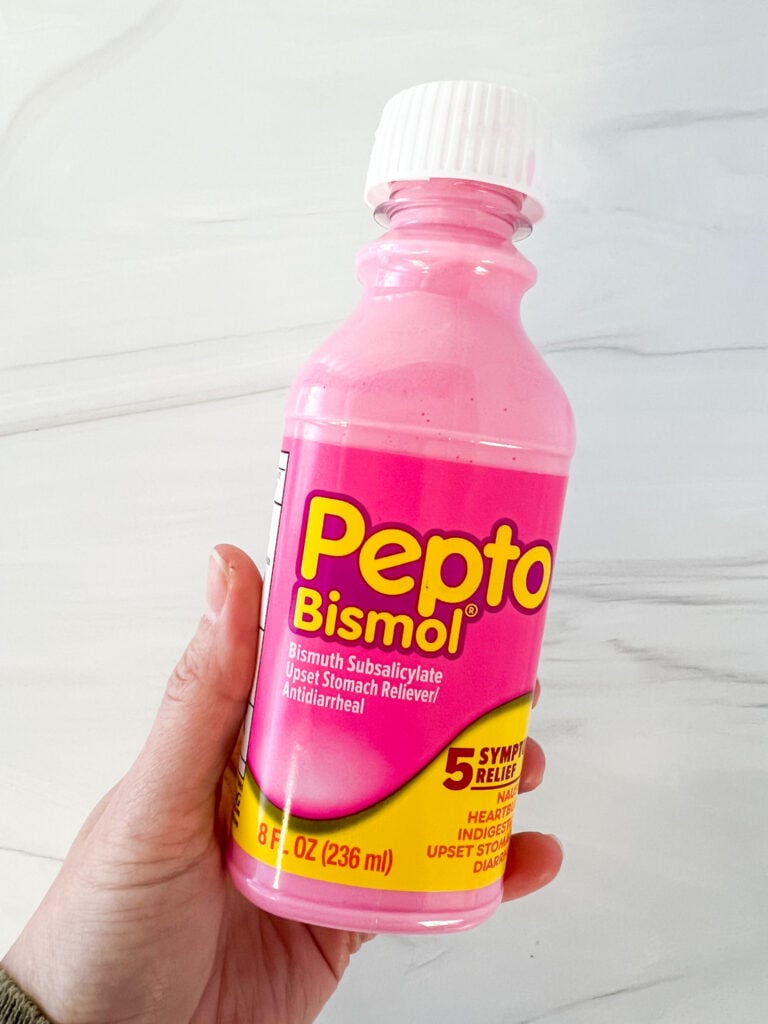
Remedy #4: Take Activated Charcoal
I haven’t taken activated charcoal, but when I asked my gluten-free community what they take after accidental exposure to gluten, it was clear that many gluten-free people already know about and take activated charcoal.
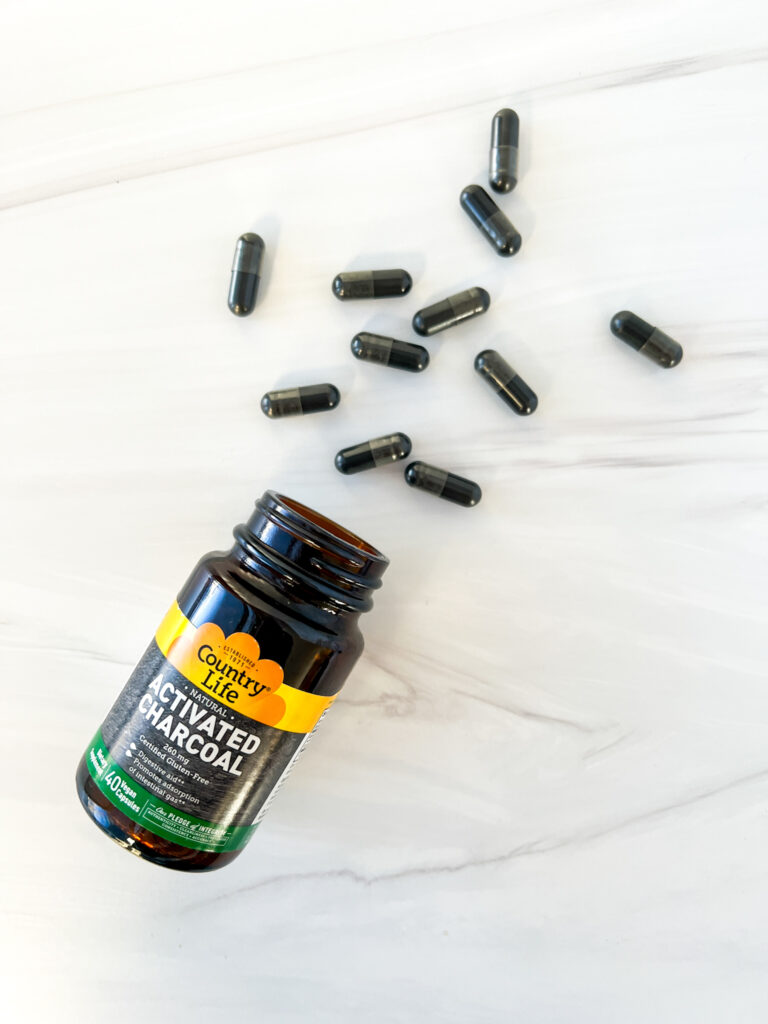
Activated charcoal is sometimes used to treat poisonings or drug overdoses because toxins bind to charcoal, which helps the body get rid of unwanted substances.
It’s also commonly used as a digestive aid due to its absorption qualities in the digestive tract. It can provide some intestinal comfort by absorbing gas and neutralizing diarrhea.
One community member told me that activated charcoal helps relieve bloating and lessens the duration of her symptoms.
However, no studies validate the use of activated charcoal in helping people recover after accidentally eating gluten. Consult your doctor before taking it.
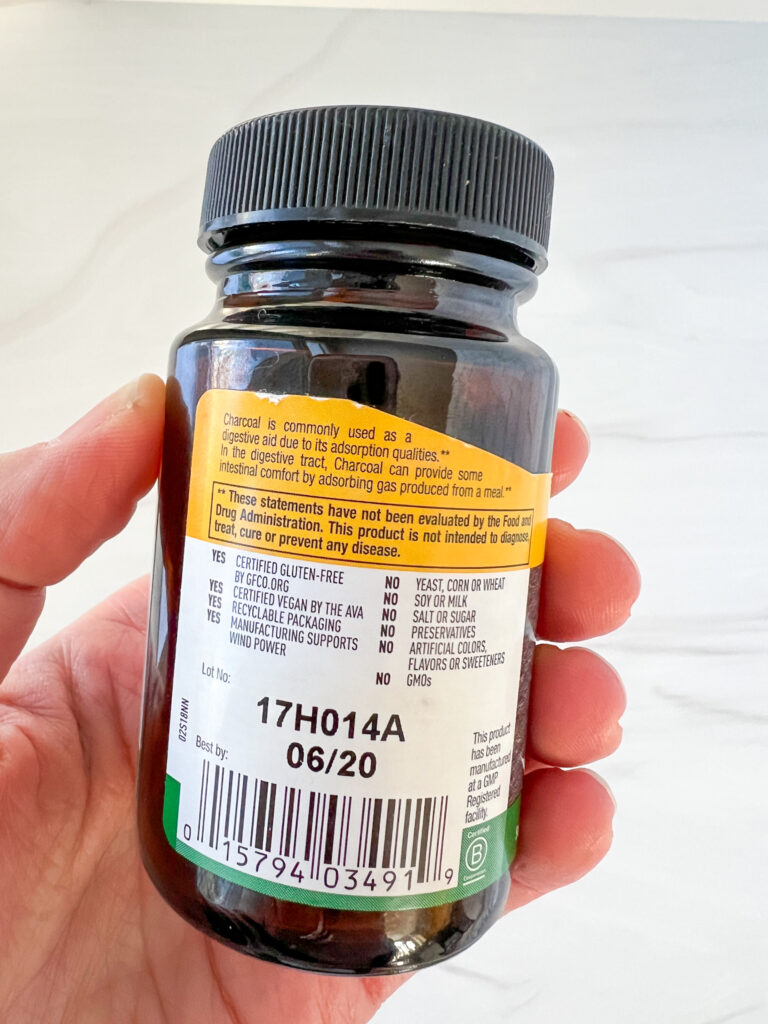
Remedy #5: Get Plenty of Rest
While you might be kicking yourself for accidentally eating gluten after all the hard work you’ve put into your gluten-free diet, go easy on yourself.
We all make mistakes; even veteran gluten-free eaters like me have made a mistake or two (or 50!).
Stay close to home when you’ve been glutened so you’re close to your bed and toilet, and give your body time to rest.
Stressing about something out of your control will only make you feel worse, and stress may compound your symptoms.
My mom always says, “This, too, shall pass.” Tomorrow is a new day to get it right.
Remedy #6: Rest Your Digestive System
Give your digestive system time to rest and recover from gluten exposure. Focus on eating easy-to-digest foods like bone broths, rice, bananas, gluten-free crackers, and tea (with lemon and ginger). These foods will help settle your roaring stomach.
Avoid eating a big meal until you feel better.
Also, avoid rich and hard-to-digest foods, such as meats and dairy. Similar to gluten, dairy contains a hard-to-digest protein called casein. Focus on easy-to-digest foods as much as possible.
Remedy #7: Take Probiotics
Did you know that 80 percent of the immune system is in the digestive tract and gut? That means a healthy gut is more likely to bounce back quickly after accidentally eating gluten.
I recommend taking a high dose of probiotics daily (at least 40 billion CFUs) to maintain good gut health continuously, as you never know when gluten might [accidentally] happen.
I think my well-nurtured gut was what helped me bounce back quickly when I accidentally ate that Trader Joe’s cookie.
If you’ve been glutened, I recommend doubling on probiotics for a few days to boost your gut health during this crisis.
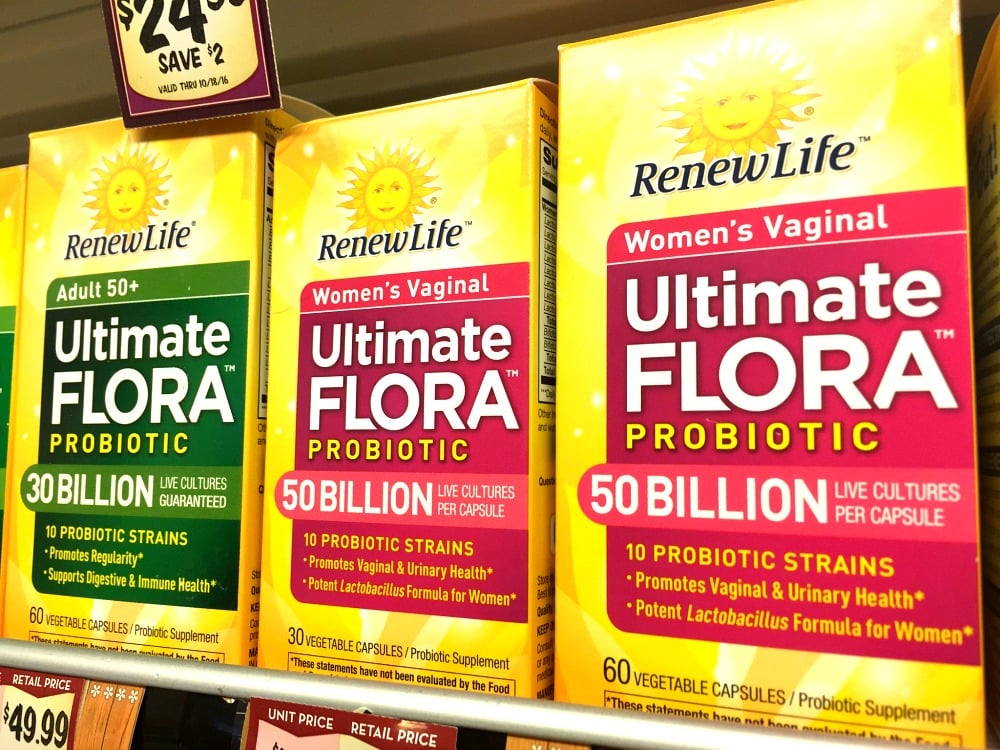
Remedy #8: Don’t Let It Happen Again
While no one is perfect, there are measures you can take to prevent accidental gluten exposure. I like to say, “When I know better, I do better.” Use this as your mantra, too.
Test Your Food Before Eating: Test a small sample of your food with a gluten-detecting device such as the Nima Sensor or Allergy Amulet before taking a bite. While this measure is important, remember that gluten-detecting devices are not foolproof and have many limitations.
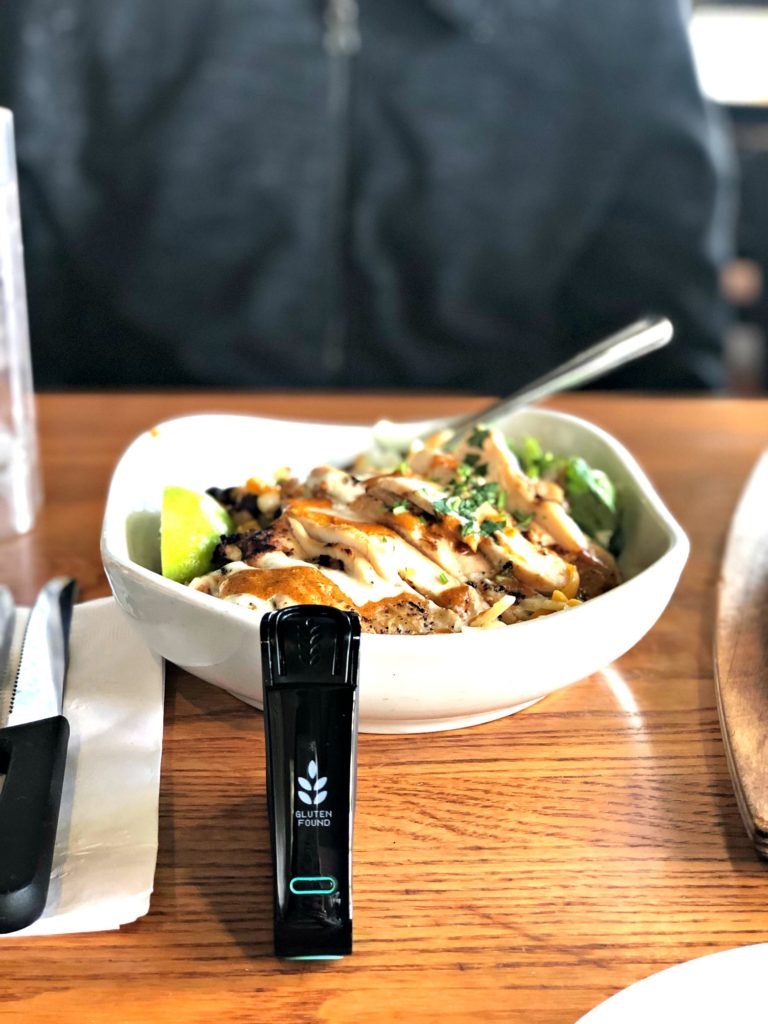
Test Your Leftovers: If you suspect the accidental glutening came from a food item and still have that food in your fridge, test it with a gluten-free detecting device. This way, you know if that particular food item was the perpetrator of your gluten attack, and you can avoid it.
Disclose, Disclose, Disclose: Before eating at a restaurant, always disclose the seriousness of your food allergy or intolerance to your waiter. Use firm language like, “I cannot eat gluten; it’s serious for me.” If you need help eating out safely, I highly recommend reading The Ultimate Guide to Eating Out Gluten-Free.
Order Wisely: When eating out, order items with the best chance of being gluten-free and the least risk of gluten cross-contamination. For example, avoid ordering pizza and pancakes unless the restaurant has specific gluten-free protocols.
Double Check Ingredient Labels: Always read ingredient labels before eating anything. Just because something looks gluten-free doesn’t mean it’s gluten-free, and just because you enjoyed a product in the past doesn’t mean the ingredient list hasn’t changed. I’ve found dozens of products that used to be gluten-free but are no longer gluten-free.
Test Your Urine: The Gluten Detect offers at-home urine and stool tests to help you self-monitor any accidental gluten exposure. If you’re unsure you’re following a 100% gluten-free diet, this test can help you figure it out and know for sure. (Read my Gluten Detect review.)
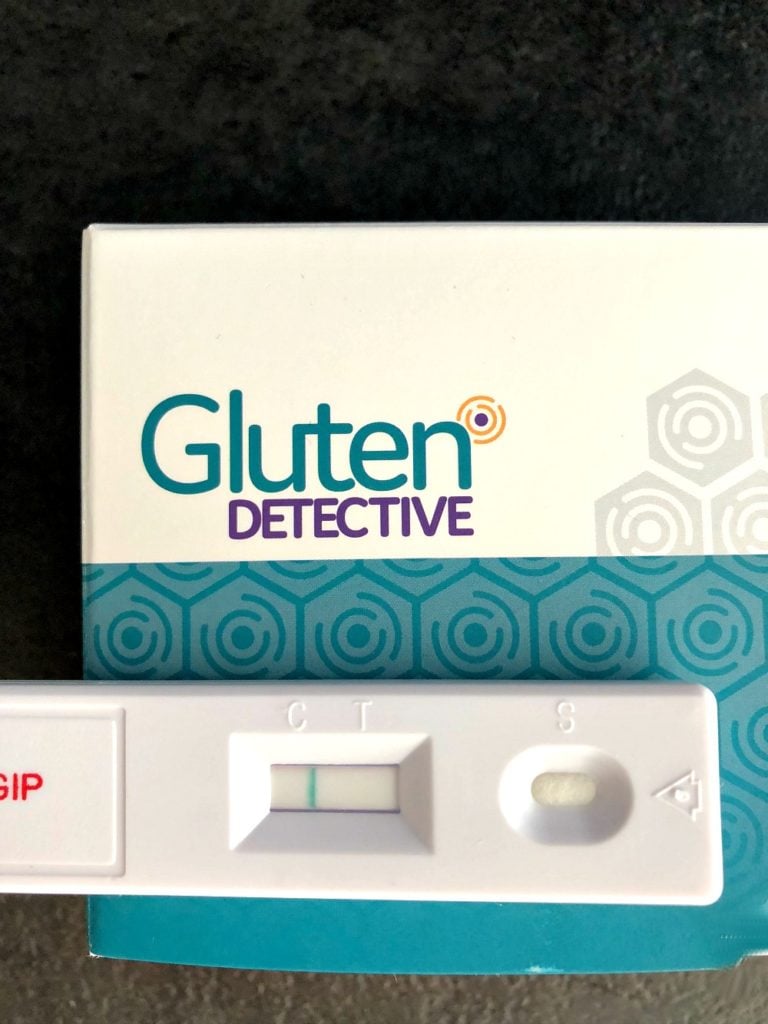
Get Educated: One of the best ways to deter accidental gluten exposure is to become an informed gluten-free consumer.
My SIGNATURE Gluten-Free Course was designed to make you a knowledgeable, well-informed, and wise consumer. If you’re new to the gluten-free lifestyle or struggling to get it right, I highly recommend enrolling in my SIGNATURE Gluten-Free Course.
Trust Your Gut: When in doubt, don’t eat it. It’s not worth it. Be mindful of everything that crosses your lips as if your health depends on it (which it does!).
The Bottom Line
The moment you realize you ate gluten can be a terrifying experience for any strict gluten-free eater.
But you can be prepared next time with these tips to quickly recover the next time it happens.
Remember, a healthy digestive system will likely bounce back more quickly after accidentally eating gluten. It’s essential that you nurture and care for your gut at all times and not just treat the symptoms.
Plus, these remedies will only help relieve the short-term symptoms of minor gluten exposure.
They should not be used as an excuse to eat gluten, nor do they address the long-term repercussions that might occur if someone with celiac disease or non-celiac gluten sensitivity continues to eat gluten or be careless with their diet.
I eat crystallized ginger (found at Trader Joe’s and Sprouts) when I have been glutened or something doesn’t agree with me. Sometimes it just takes 1 piece to feel better.
I’ve never heard that but will try it. Thank you for the tip!
This may sound odd, but several celiacs I know recommend Dr. Pepper to reduce the unpleasant symptoms from getting glutened. I’ve used it many times and can attest that it dramatically reduces the discomfort. I have no idea why it works, but it does! I’ve started using it as a preemptive measure when I eat out in case I inadvertently get contaminated. Social occasions like eating out are the worst times to be suffering such symptoms. I’m curious to hear if others find it helps them too.
I used to take charcoal, and it really helped. HOWEVER, do NOT use charcoal if you take slow release medications. Charcoal does not discriminate and will absorb that medication. And if you take routine medicine, I would take the charcoal a few hours BEFORE your medication, so it will hopefully have passed on through and not absorb what you take.
That being said, I appreciate your article and will be going to fix some lemon tea now.
I eat a sour orange or a pomegranate as we have both trees. I feel the acid helps take the edge off. Pineapple helps too.
The one in Canada is called gluten cutter also dairy intolerant one as I have that as well. I only use it when I start to break out in the hives from being contaminated as I don’t want my body getting use to it. Thanks for the great info I drink lots of water as well with lime didn’t know about coconut water def something to keep in mind.
It’s a portable gluten detecting device. Learn more here – https://www.goodforyouglutenfree.com/nima-sensor/
What is a Nima Sensor.
Activated charcoal is our new best friend. We never travel without it anymore. It makes a huge difference when my husband gets accidentally ‘glutened.’